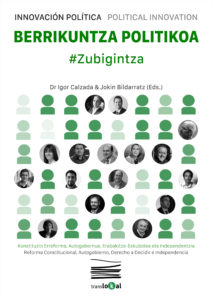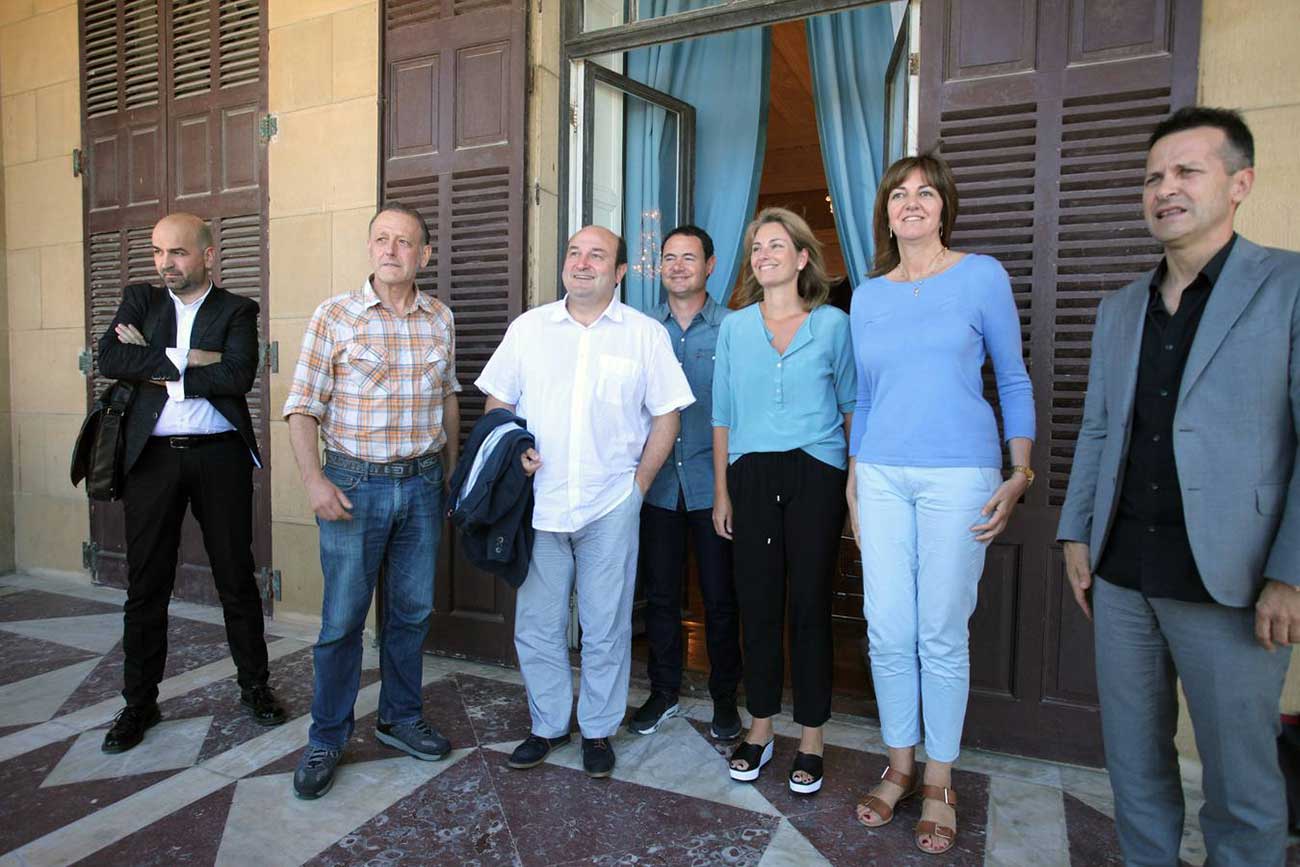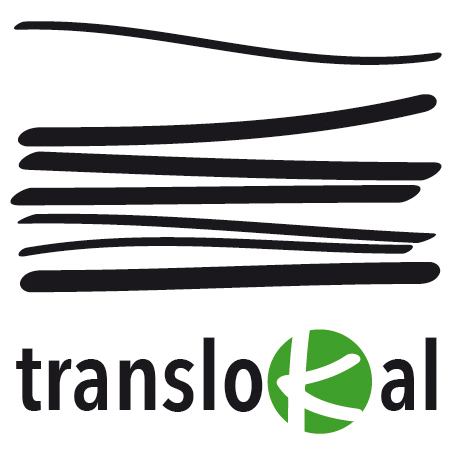
Political Innovation
 Political Innovation: Constitutional Change, Self-Government, The Right To Decide & Independence
Political Innovation: Constitutional Change, Self-Government, The Right To Decide & Independence
This book aims to suggest an strategic pathway for the Basque Country in a broader European context. The book is structured in four parts: Constitutional Change, Self-Government, The Right to Decide and Independence. The content of the book is a direct outcome from the Political Innovation 2015 Summer School that took place in St Sebastian in the Basque Country (Spain) in July 9-10 2015, with the participation of a broad political representation ensuring the relevant moment of gathering the five political Basque leaders in a political innovation lab (workshop) in direct interaction with the participants.
The Summer School aims to address a critical, multidisciplinary, strategic, and inclusive political analysis among political parties, citizens, and social movements regarding current issues in Basque society. One hotly contested issue concerns the territorial configuration of the nationstate and their regions and nations. After a long period of political violence, the Basque Country should currently become home a wide range of diverse political sensibilities coexisting in a broad global European context that determines the everyday policy implementation of many regional institutions. Increasingly, a debate regarding constitutional change, the present unique context in Catalonia and Basque Country, and the right to decide via majority of the Basque society should be considered a starting point for a general reflection and debate among agents and the citizenship. Now is the proper time to open up the debate in Basque society by reviewing and re-scaling the need to acquire innovative political practices in order to bring the political discussion closer to the citizenship while improving the strategy’s design. Now is the time for Political Innovation in the Basque Country.

5 main basque political parties´s presidents – This photo was published on 9th July 2015 by www.diariovasco.com
The Summer School will congregate a whole range of agents who are willing to contribute to this challenge, either directly or indirectly. An inclusive methodology will be the key principle, as several diverse perspectives and themes will be addressed. Similarly, the debate and participation results as core element that will be extended to future editions and topics.
Political Innovation should be considered the pivotal strategic transversal at the discussion table in both the present and the future. Such discussion will facilitate consensus and agreements while learning from the criteria differentiation and disagreement.
Aims
- To establish Political Innovation core foundations: principles, methodologies, international comparative cases, and challenges for the Basque Country.
- To conduct and invite participants to a critical and open reflection about diverse constitutive tensions between regional democracies in the European Union, the re-scaling process in nation-states, and the emergence of the civic nationalism phenomenon. Should “sovereignty” as a term be reformulated? What about the concept of the “nation”?
- To portray the Basque Country in Europe: multilevel governance, the Europe of the regions, and opportunities and real possibilities for stateless nations.
- To analyse relationships with Spain and France. Territorial, federal, and (pluri)national debate: Constitutional Change? Policy-based re-scaling process in the nation-states.
- To look into the Right to Decide and the related shift in the democratic paradigm. Presentation of cases where the Right to Decide has been articulated and consideration of its potential.
- To interpret the relationship between sovereignty, self-government, and independence.
- To merge academics with the political sector and viceversa by creating a discourse among academics, politicians, policy-makers, social movements, businesses, institutions, and citizens.
The book is based on the four core axes that define, and will explain, the speech and the practice of the Basque politics onwards: the Spanish Constitutional Change, the Self-Government, the Right to Decide and the Independence. This project, which is intended to be a constructive and transformative contribution, builds bridges: on the one hand, between different political sensitivities, and on the other hand, in order to join policy-makers and the academics together.
Building bridges is the DNA of the Basque Political Innovation paradigm. It is focused on building bridges, walking a mile in someone else’s shoes, understanding each other, feeling each other. In a nutshell, working together for the Basque society. In the Basque Country, that means seeking the political empathy driven by transformational empowered citizenship. Indeed, the political future is built today, by all of us: having a look into each other’s eyes, pushing forward.
Citation:
Calzada, I. & Bildarratz, J. (Eds.)(2015), Political Innovation: Constitutional Change, Self-Government, The Right To Decide & Independence, TransLoKal – Academic Entrepreneurship for Policy Making – Publishing, Donostia. ISBN (paperback): 978-84-942752-4-1 & (ebook): 978-84-942752-6-5. DOI: 10.13140/RG.2.2.13761.76645.
Web reference:
Buy Book Printed Buy e-book
Partners
Summer & European Courses. University of the Basque Country, Gipuzkoa Provincial Council, IVAP Basque Institute for Public Administration, Elduaien Language School, Haratago Communication & Elkar Group
People
Urko Aiartza, Hasier Arraiz, Xabier Arzoz, Xabier Barandiaran, Jokin Bildarratz, Igor Calzada, Héctor Fernández, Tassilo Herrschel, Eduardo Madina, Idoia Mendia, Zelai Nikolas, Andoni Ortuzar, Arantza Quiroga, Ferrán Requejo, Roberto Uriarte, Eduardo Vírgala and Eneko Axpe, Ariane Pecino & Amaiur Alvarez as students
Date
2015

